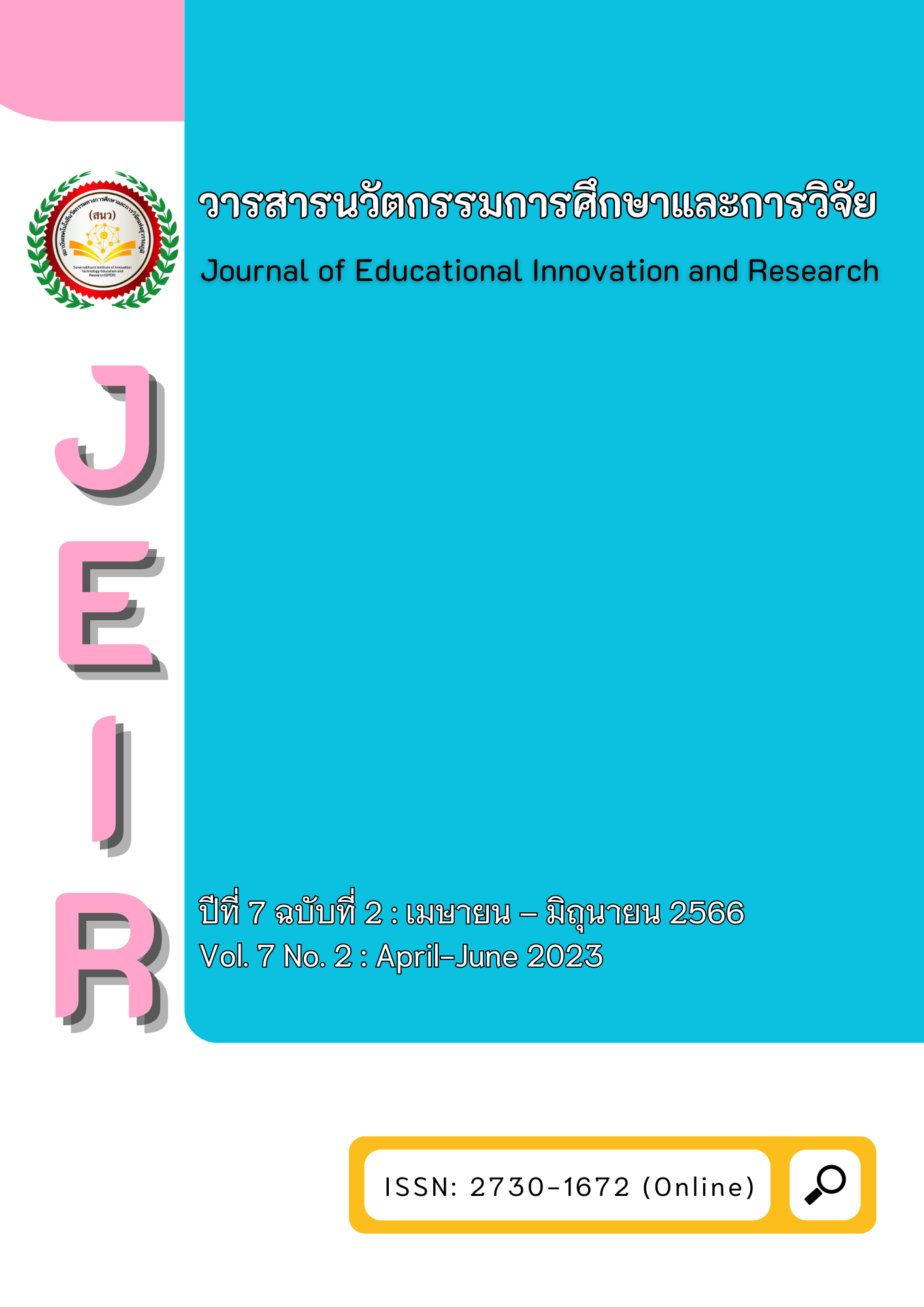สหสัมพันธ์คาโนนิคอลระหว่างการบริหารแบบมีส่วนร่วมกับประสิทธิผลโรงเรียนมัธยมศึกษาขนาดเล็ก
Main Article Content
บทคัดย่อ
การวิจัยนี้มีวัตถุประสงค์ 1) เพื่อทราบองค์ประกอบการบริหารแบบมีส่วนร่วมของโรงเรียนมัธยมศึกษาขนาดเล็ก 2) เพื่อทราบองค์ประกอบประสิทธิผลของโรงเรียนมัธยมศึกษาขนาดเล็กและ 3) เพื่อทราบสหสัมพันธ์คาโนนิคอลระหว่างการบริหารแบบมีส่วนร่วมกับประสิทธิผลโรงเรียนมัธยมศึกษาขนาดเล็ก กลุ่มตัวอย่าง คือ โรงเรียนมัธยมศึกษาขนาดเล็ก จำนวน 94 โรงเรียน ผู้ให้ข้อมูล คือ ผู้อำนวยการโรงเรียน หัวหน้ากลุ่มสาระการเรียนรู้ และประธานคณะกรรมการสถานศึกษาขั้นพื้นฐาน จำนวน 282 คน ใช้วิธีการสุ่มแบบแบ่งประเภท จำแนกตามภูมิภาค การวิจัยครั้งนี้เป็นการวิจัยแบบกลุ่มตัวอย่างเดียว เครื่องมือที่ใช้ในการวิจัยมี 2 ชนิด คือ 1) แบบสัมภาษณ์กึ่งโครงสร้าง2) แบบสอบถามความคิดเห็น สถิติที่ใช้ในการวิเคราะห์ข้อมูล คือ ความถี่ ร้อยละ มัชฌิมเลขคณิต ส่วนเบี่ยงเบนมาตรฐาน การวิเคราะห์องค์ประกอบเชิงสำรวจ การวิเคราะห์องค์ประกอบเชิงยืนยัน และการวิเคราะห์สหสัมพันธ์คาโนนิคอล ผลการวิจัยพบว่า
1. การบริหารแบบมีส่วนร่วมของโรงเรียนมัธยมศึกษาขนาดเล็ก ประกอบด้วย 6 องค์ประกอบ คือ 1) การพัฒนาบุคลากรให้มีประสิทธิภาพ 2) การติดต่อสื่อสารและการใช้ข้อมูลสารสนเทศ 3) การมีภาวะผู้นำของผู้บริหาร 4) การสร้างบรรยากาศและความผูกพัน 5) การส่งเสริมการมีส่วนร่วมในการบริหารสถานศึกษา 6) การกำหนดเป้าหมายร่วมกัน
2. ประสิทธิผลโรงเรียนมัธยมศึกษาขนาดเล็กประกอบด้วย 6 องค์ประกอบ คือ 1) การประเมินผลการเรียนรู้ 2) ภาวะผู้นำของโรงเรียนและชั้นเรียน 3) การมีส่วนร่วมของนักเรียน
4) หลักสูตรการเรียนการสอน 5) การวางแผนโปรแกรม 6) ความร่วมมือของบ้าน โรงเรียนและชุมชน และมีความสอดคล้องกับข้อมูลเชิงประจักษ์ทุกองค์ประกอบ
3. สหสัมพันธ์คาโนนิคอลระหว่างการบริหารแบบมีส่วนร่วมกับประสิทธิผลโรงเรียนมัธยมศึกษาขนาดเล็กเป็นรูปแบบความสัมพันธ์ขององค์ประกอบที่มีความสัมพันธ์กัน
Article Details

อนุญาตภายใต้เงื่อนไข Creative Commons Attribution-NonCommercial-NoDerivatives 4.0 International License.
เอกสารอ้างอิง
เกศกนก ณ พัทลุง. (2556). การพัฒนารูปแบบโรงเรียนมัธยมศึกษาที่มีประสิทธิผลสำหรับประเทศไทย (วิทยานิพนธ์ครุศาสตรดุษฎีบัณฑิต). จุฬาลงกรณ์มหาวิทยาลัย.
ธร สุนทรายุทธ. (2556). ทฤษฎีองค์กรและพฤติกรรม. กรุงเทพฯ: เนติกุล.
นุกูล ชูทอง. (2559). ประสิทธิผลองค์การ. กรุงเทพฯ: ไอดี ออล พริ้นท์.
นุชนาถ สอนสง. (2559). การบริหารแบบมีส่วนร่วมของกลุ่มเครือข่ายส่งเสริมประสิทธิภาพการจัดการมัธยมศึกษาจังหวัด (วิทยานิพนธ์ปรัชญาดุษฎีบัณฑิต). มหาวิทยาลัยศิลปากร.
รัตน์ฐาภัทร์ ธนโชติสุขสบาย. (2557). ทักษะทางวิทยาศาสตร์ของผู้บริหารที่ส่งผลต่อการบริหารแบบมี ส่วนร่วมในโรงเรียนสังกัดสำนักงานคณะกรรมการการศึกษาขั้นพื้นฐาน (วิทยานิพนธ์ปรัชญาดุษฎีบัณฑิต). มหาวิทยาลัยศิลปากร.
ศุภชัย จันครา. (2561). กลยุทธ์การบริหารแบบมีส่วนร่วมของโรงเรียนมัธยมศึกษา สังกัดสำนักงานเขตพื้นที่การศึกษามัธยมศึกษาเขต 28 (วิทยานิพนธ์ครุศาสตรดุษฎีบัณฑิต). มหาวิทยาลัยราชภัฏศรีสะเกษ.
สถาบันทดสอบทางการศึกษาแห่งชาติ (องค์การมหาชน). (2564). ค่าสถิติพื้นฐานแสดงคะแนนเฉลี่ยของผลการทดสอบ O-Net ชั้นมัธยมศึกษาปีที่ 3 จำแนกตามขนาดโรงเรียน เล็ก กลาง ใหญ่ ใหญ่พิเศษ. สืบค้นเมื่อ 8 พฤษภาคม 2564, จาก https://data.go.th/dataset/it-16-08
สำนักงานเลขาธิการวุฒิสภา. (2560). รัฐธรรมนูญแห่งราชอาณาจักรไทย พุทธศักราช 2560.กรุงเทพฯ: สำนักงานเลขาธิการวุฒิสภา.
อมรา ไชยดำ. (2559). ประสิทธิผลของสถานศึกษาในสังกัดสำนักงานเขตพื้นที่การศึกษามัธยมศึกษา เขต 27. วารสารบัณฑิตศึกษา มหาวิทยาลัยราชภัฏสกลนคร, 13(61), 209-223.
อิทธิพล พลเหี้ยมหาญ. (2562). การพัฒนารูปแบบการบริหารโรงเรียนมัธยมศึกษาขนาดเล็กที่มีประสิทธิผล สังกัดสำนักงานเขตพื้นที่การศึกษามัธยมศึกษาในภาคตะวันออกเฉียงเหนือ(วิทยานิพนธ์ปรัชญาดุษฎีบัณฑิต). มหาวิทยาลัยราชภัฏสกลนคร.
Boroumand, N. (2012). The role of effective human resource factors in participative management:A comparative study between Indian and Iranian employees. Faculty of Management Studies University of Delhi.
Boyarkova, V. (2012). Participative Management Style as A Team Stability. Moscow: Leroy Merlin.
Bryman, A. (2013). Leadership and Organizations. London: Taylor and Francis.
Burhanuddin. (2013). Participative management and its relationships with employee performance behaviour: a study in the university sector in malang Indonesia. University of Adelaide.
Hoy, Wayne K. and Cecil G. Miskel. (2012). Educational Administration: Theory Research and Practice. (9th ed.). New York: McGraw-Hill.
Linski, C.M. (2014).Transitioning to Participative Management. Organization Development Jornal,2(3), 17-26.
Lunenburg, Fred C.,and Allan C. Ornstein. (2012). Educational Administration: Concept and Practices. (6th ed.). Belmont: Wadsworth.
Marzano, R.J. (2012).Marzano Levels of School Effectiveness. Bloomington: Business Development.
Manuela, P. (2012). Participative management and its influence on organizational change. Management Decision, 50(10), 1843-1860.
Shabankareh, A.N.T. and Rastgar, M. (2012).The Relation between organization structure and participative management among the employees of physical education organization. University Firoozabad Branch.
The Ontario Ministry of Education. (2013). School Effectiveness Framework. Ontario: Queen printer.
Yukl, G. (2013). Leadership in Organization. (8th ed.). New York: Pearson.
Yamane, T. (1973) Statistics: An Introductory Analysis. 3rd Edition. New York: Harper and Row.


